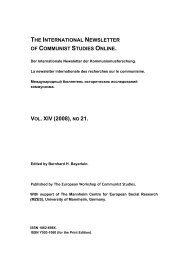11RXNdQ
11RXNdQ
11RXNdQ
You also want an ePaper? Increase the reach of your titles
YUMPU automatically turns print PDFs into web optimized ePapers that Google loves.
Colonialism and Neocolonialism 66<br />
then to the other, which has the effect of displeasing everyone.<br />
But a voter is not a politician. Voting is not engaging in politics, but approving or<br />
rejecting precisely what is unambiguous about a given policy.You should not say to the<br />
voters: ‘You will be voting for a man who is running into such and such resistance, who<br />
has to manage such and such a group, and who in any case will be made to do something<br />
different from what he is asking you to approve’. You should give them a clear choice.<br />
Today they are saying to us : ‘If you vote for provisional institutions, you will be<br />
voting for negotiation and self-determination.’ What does that mean? Either we vote for<br />
the institutions, in which case self-determination will be prefabricated. Or we vote to give<br />
de Gaulle the necessary authority to negotiate. In this case, the wrong question is being<br />
asked. It should have been: ‘Do you want a negotiated peace?’ Saying ‘yes’ to the<br />
institutions in no way reinforces de Gaulle’s position vis-à-vis the right and the army.<br />
They will say: ‘The French may well have voted for the institutions, but not for you to<br />
negotiate.’ This is where Machiavellianism turns against Machiavelli. Even if de Gaulle<br />
obtains 90 per cent of the vote, it will be a vote whose mandate can be interpreted any<br />
way you like since one response will have been made to two contradictory questions.<br />
L’Express: In fact, it’s really a case of enabling de Gaulle to pursue his policy<br />
and allowing him the choice of methods.<br />
Jean-Paul Sartre: What is this policy? It consists of putting provisional institutions in<br />
place in Algeria, with certain powers entrusted to selected individuals in both<br />
communities. These institutions – as the recent events in Algiers and Oran have shown –<br />
will have no authority over the population. Anyone who agrees to participate in them will<br />
be regarded by the Muslim majority, and probably also by the Europeans, as Quislings.<br />
Their authority, therefore, will be able to rely only on force. For that the harkis will not<br />
suffice. The French Army will be needed.<br />
All in all, to vote for the institutions is to enable the French Army to stay on in Algeria,<br />
no longer to ‘pacify’ as it has been doing up until now, but to preserve a supposedly<br />
achieved peace. Basically, nothing will have changed. The work will be a bit different,<br />
however. Instead of shooting at men who are fighting for their independence but who are,<br />
after all, combatants, instead of doing police jobs which degrade it morally but can pass<br />
as the hunt for terrorists, this time the Army will have to shoot at unarmed crowds. That’s<br />
what happened during the latest demonstrations.<br />
There has been a lot of talk about the thirty victims whose post mortems proved that<br />
they were killed by civilians. But since the official figures are faked and even the<br />
Europeans talk about 500 deaths and not 150, we really have to come to the conclusion<br />
that it was the paratroops who killed most of them. We will therefore have an Army<br />
which, on the pretext that peace already exists or that it is in sight, will be forced almost<br />
the whole time to shoot at unarmed demonstrators.<br />
We can ask ourselves, therefore, whether the Referendum doesn’t in fact amount to<br />
justifying keeping the Army in Algeria while at the same time aggravating the nature of<br />
its action. Perhaps de Gaulle doesn’t realize this. It is certain, however, that the Army<br />
sees a big difference between the Referendum and negotiations. If negotiations had been<br />
announced, it would not have had the basically consenting attitude it adopted to the




